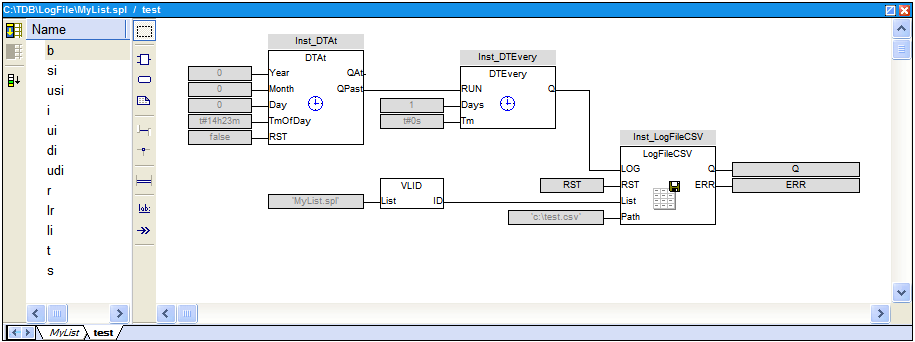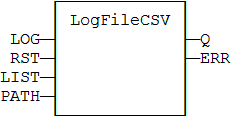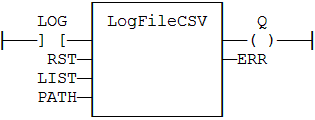
Function block - Generate a log file in CSV format for a list of variables
LOG : BOOL Variables are saved on any rising edge of this
input
RST : BOOL
Reset the contents of the CSV
file
LIST :
DINT ID of the
list of variables to log (use VLID
function)
PATH :
STRING Pathname of the CSV
file
Q :
BOOL TRUE if the requested operation has been performed
without error
ERR :
DINT Error report for the last requested operation (0 is
OK)
Important notes
|
This function enables to log values of a list of variables in a CSV file. On each rising edge of the LOG input, one more line of values is added to the file. There is one column for each variable, as they are defined in the list.
The list of variables is prepared using the workbench or a text editor. Use the VLID function to get the identifier of the list.
On a rising edge of the RST command, the file is emptied.
When a LOG or RST command is requested, the Q output is set to TRUE if successful. In case of error, a report is given in the ERR output. Possible error values are:
1 = Cannot reset file on a RST command
2 = Cannot open file for data storing on a LOG command
3 = Embedded lists are not supported by the runtime
4 = Invalid list ID
5 = Error while writing to file
Combined with real time clock management functions, this block provides a very easy way to generate a periodical log file. The following example shows a list and a program that log values everyday at 14h23:

(* MyLOG is a declared instance of LogFileCSV
function block *)
MyLOG (LOG, RST, LIST, PATH);
Q := MyLOG.Q;
ERR := MyLog.ERR;


(* MyLOG is a declared
instance of LogFileCSV function block *)
Op1: CAL MyLOG (LOG, RST, LIST, PATH);
LD MyLOG.Q
ST Q
LD MyLog.ERR
ST ERR